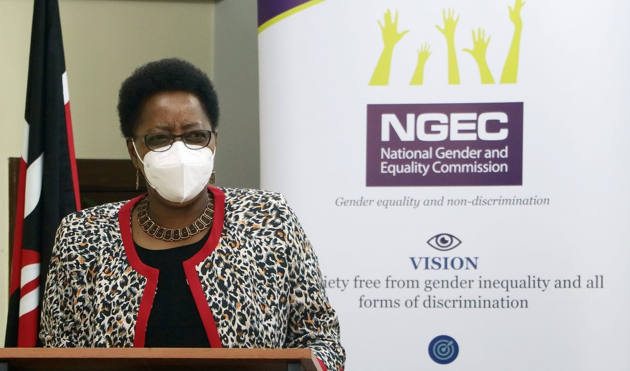STATEMENT ON THE OBSERVANCE OF 16 DAYS OF ACTIVISM AGAINST GENDER-BASED VIOLENCE
The National Gender and Equality Commission (NGEC) joins the world in commemorating the 16 Days of Activism against Gender-Based Violence. This is an annual campaign that calls for concerted efforts for the prevention and elimination of violence among women and girls. The 2022 theme is “UNITE! Activism to end violence against women and girls”. The campaign runs between 25th November and 10th of December every year.
Gender-Based Violence (GBV) is a human rights violation that disproportionately affects women and girls. GBV takes different forms including physical, sexual, financial, psychological, and invisible violations. GBV undermines the achievement of gender equality and ultimately societal sustainable development. Violence against women and girls is rampant and largely happens in private and public spaces. Globally, it is estimated that 736 million women—almost one in three—have been subjected to physical and/or sexual intimate partner violence, non-partner sexual violence, or both, at least once in their life (30 percent of women aged 15 and older)
In Kenya, the story is not different. Reports from various sources including the Gender-Based Violence Recovery Centers (GBVRC), Media, and hotlines, among others, indicate an increase in the reported cases of GBV over the last three years. According to data from Gender-Based Violence Recovery Centers, one in three Kenyan females has experienced an episode of sexual violence before attaining the age of 18 while between 39% and 47% of Kenyan women experience GBV in their lifetime. The common types of reported cases of GBV include defilement, rape, sexual assault, physical violence, and trafficking of women and girls. Kenya has also witnessed increased reporting of cases of violence directed at women domestic workers, particularly those working in the middle east.
The cultural norms, societal practices, traditions, patriarchal attitudes and deep-rooted stereotypes regarding the roles, responsibilities, and identities are major contributors to violence against women and girls. Studies show that among 16% of females who experience childhood sexual violence, two-thirds are likely to experience multiple incidences before they turn age eighteen. Intimate partners remain the most common perpetrators of violence among younger women.
Despite the perpetual low reporting levels of GBV, it is clear that GBV incidences increase during times of crises, emergencies and elections. For example, during the current drought affecting nearly a third of the country, the Commission is concerned about the potential increase in violence directed at women and girls. Such may include sexual exploitation in return for food favours, reduce school attendance for girls, loss of community resilience resulting in many men migrating to urban areas, and men's withdrawal of financial and emotional support to families, just to mention a few. Undoubtedly, women and children with disabilities, older women living alone, women living in displacement camps, and women formerly married, are projected to be more likely to experience GBV compared to other groups. In elections, lots of overt violence is perpetuated through cyberbullying and cyberstalking, negative stereotypes, and the use of demeaning figurative expressions.
The Commission applauds the government for increased efforts and investment towards eliminating all forms of violence and discrimination against women and girls. In 2021, Kenya through the Generation Equality Forum Commitments agreed to among others end Female Genital Mutilation by 2022, end all forms of GBV by 2026, and include a module on GBV in the 2022 Kenya Demographic Health Survey. Despite these commitments, the existing laws, policies, and programs on GBV, the Commission is concerned with the slow pace and progress made towards ending GBV in Kenya.
During the 16 days of activism, the Commission calls for a renewed commitment to increasing attention and investments in GBV prevention, response and management at national, county, private sector, and community levels. All actors have the opportunity of ensuring that GBV programming is focused on rehabilitating perpetrators, reducing the recurrence of GBV offences, accelerating access to justice for survivors, and applying survivor-centred approaches. Further, all GBV programs should aim at engaging men and boys at all levels of prevention and response.
The Commission is committed to coordinating all actors to take immediate actions necessary to end GBV in Kenya.
Signed
Dr. Joyce Mwikali Mutinda PhD, EBS
Chairperson, National Gender and Equality Commission


Comments